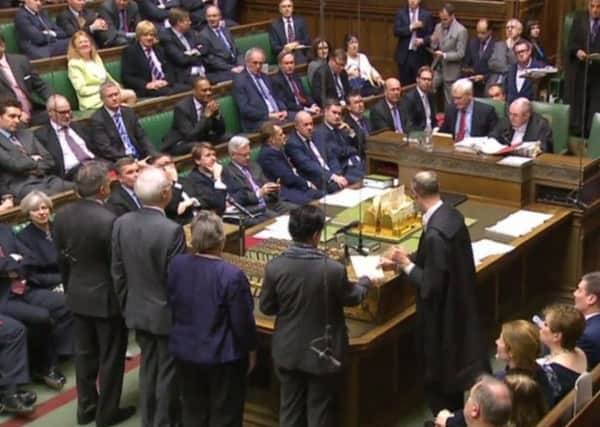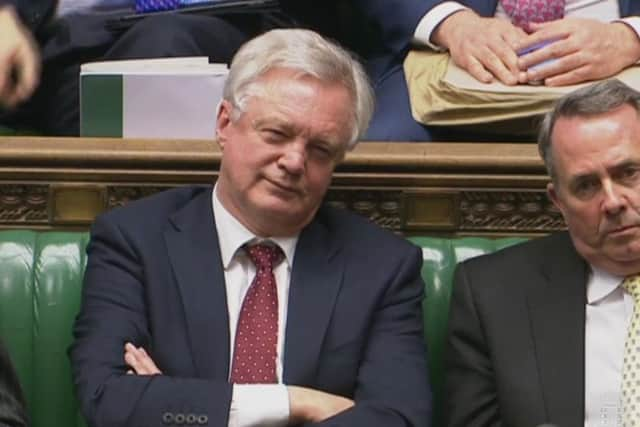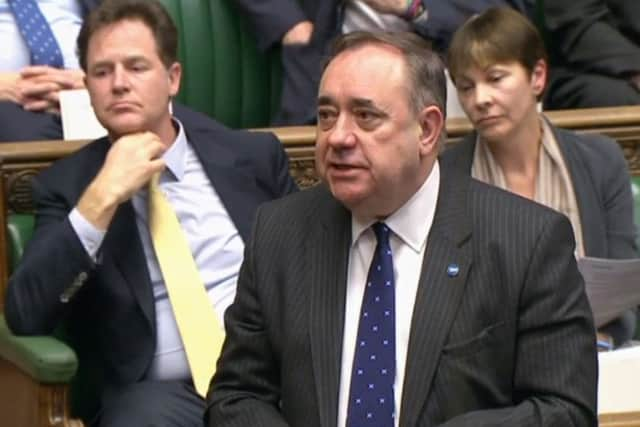Brexit moves closer after Parliament paves way for PM to trigger Article 50


The House of Lords backed down in its battle with ministers over its attempt to change the legislation that authorises the Prime Minister to invoke Article 50 of the EU treaties marking the start of the two-year withdrawal process.
The votes in the upper chamber – after the Commons overturned two amendments previously backed by peers – allow the European Union (Notification of Withdrawal) Bill to complete its passage through Parliament.
Advertisement
Hide AdAdvertisement
Hide AdThe result was hailed by Brexit Secretary David Davis who said ministers would now get on with the job of building “a positive new partnership” with the remaining member states.


“We are now on the threshold of the most important negotiation for our country in a generation,” he said.
Despite speculation that Mrs May would immediately notify the European Council she was beginning the formal withdrawal process, Downing Street indicated she would wait another two weeks until the end of the month - her long-stated deadline for doing so.
The Prime Minister’s official spokesman played down suggestions she was delaying due to Scottish First Minister Nicola Sturgeon’s bombshell announcement of a second independence referendum in the run-up to Brexit - expected in spring 2019.
Advertisement
Hide AdAdvertisement
Hide AdThe spokesman told reporters Mrs May had always said she would trigger Article 50 by the end of March, adding: “I’ve said ‘end’ many times but it would seem I didn’t put it in capital letters strongly enough.”


EU leaders had been prepared for an announcement this week, with April 6 pencilled in as the date for a meeting of the other 27 to respond to the move - a gathering which will now be pushed back until later that month.
Waiting until the last week of March would not only avoid a clash with the Dutch general election on Wednesday, but also delay the start of negotiations until after a special summit of the remaining 27 in Rome on March 25 to celebrate the EU’s 60th anniversary.
Earlier, the Commons voted overwhelmingly to overturn two previous Lords amendments, requiring Parliament to be given a “meaningful vote” at the end of the negotiations and guaranteeing the rights of EU nationals living in the UK.
Advertisement
Hide AdAdvertisement
Hide AdAfter rebel Tory MPs who had previously backed similar moves in the Commons largely chose to abstain, Labour accepted it would be an “empty gesture” to try to reinstate them in the unelected upper chamber.


While Liberal Democrat peers continued to resist, the amendment on the meaningful vote was defeated by 274 to 118 in the Lords and the EU nationals amendment was defeated by 274 to 135.
It followed Commons votes earlier in the day rejecting the meaningful vote amendment by 331 to 286 and the EU nationals amendment by 335 to 287.
Opening the Commons debate, Mr Davis said the majority of voters, regardless of whether they backed Leave or Remain, wanted Mrs May to “get on with the job in hand” and to do so “with no strings attached”.
Advertisement
Hide AdAdvertisement
Hide AdHe warned that calls for a parliamentary vote on the deal could be interpreted as an attempt to defy the will of the British people.


“Whilst it has been badged as a meaningful vote, the reality is there are some who would seek to use this to overturn the result of the referendum,” he said.
Labour leader Jeremy Corbyn said it was “deeply disappointing” the Government had refused to give ground but it was “only the start of the process”.
“Labour, at every stage, will challenge the Government’s plans for a bargain basement Brexit with Labour’s alternative of a Brexit that puts jobs, living standards and rights first,” he said.